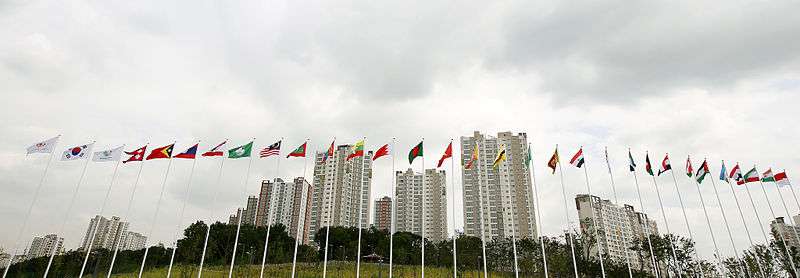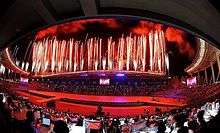2014 Asian Games
 Official emblem of the 2014 Asian Games. | |||
| Host city | Incheon, South Korea | ||
|---|---|---|---|
| Motto |
Diversity Shines Here (Korean: 평화의 숨결, 아시아의 미래, Hanja:平和의 숨결, 아시아의 未來) | ||
| Nations participating | 45 | ||
| Athletes participating | 9,501 | ||
| Events | 439 in 36 sports | ||
| Opening ceremony | 19 September | ||
| Closing ceremony | 4 October | ||
| Officially opened by |
Park Geun-hye President of South Korea | ||
| Officially closed by |
Ahmad Al-Fahad Al-Sabah President of the Olympic Council of Asia | ||
| Athlete's Oath |
Oh Jin-hyek Nam Hyun-hee | ||
| Judge's Oath |
Kim Hong-lae Shu Hea-jung | ||
| Torch lighter | Lee Young-ae | ||
| Main venue | Incheon Asiad Main Stadium | ||
| Website | Official website | ||
| |||
| Part of a series on |
The 2014 Asian Games (Korean: 2014년 아시안 게임, translit. 2014nyeon asian geim, Hanja:2014年 아시안 게임), officially known as the 17th Asian Games, was a pan-Asian multi-sport event held in Incheon, South Korea.[1] This was the third time South Korea hosted the Asian Games, and its' first time since 2002. Previously, it had also hosted the 1986 edition of the games.
Incheon was awarded the right on 17 April 2007, defeating Delhi, India to host the Games and was the third city in South Korea after Seoul (1986) and Busan (2002) to host the Asian Games. The games was held from 19 September to 4 October 2014, although several events had commenced from 14 September 2014. Around 9,501 athletes participated in the event which featured 439 events in 36 sports. It was opened by the President of South Korea, Park Geun-hye at the Incheon Asiad Main Stadium.
The final medal tally was led by China, followed by host South Korea and Japan, while Cambodia won its' first ever Asian Games gold medal. 14 World and 27 Asian records were broken during the Games.[2] Japanese swimmer Kosuke Hagino was announced as the most valuable player (MVP) of the Games.[3] Though there were several controversies, the Games were deemed generally successful with its low hosting cost and with the rising standard of competition amongst the Asian nations.[4]
Bidding process
| City | Country | Votes |
|---|---|---|
| Incheon | 32 | |
| New Delhi | 13 |
Two cities bid for the Games. Both New Delhi (India) and Incheon (South Korea) submitted their formal bid on 2 December 2006 in Doha, Qatar.[5]
The vote was held on 17 April 2007 at the Marriott Hotel in Kuwait City, Kuwait, during the OCA's general assembly. During the final presentation prior to voting, Incheon made a new offer, raising USD$20 million funds to support the countries that are yet to win a medal in the Games. It also offered free flight tickets and accommodation to all the participants, while India did not make any changes to its offer.[6][7] All 45 members voted, with voting held in secret ballot. Later that day, it was announced that Incheon won the rights.[8] Though the vote results were not released, it was revealed that Incheon won by 32–13.[9]
It was widely felt that Delhi's lack of enthusiasm to host the event was the primary reason for its loss. Then Union Sports Minister of India, Mani Shankar Aiyar, spoke strongly against Delhi hosting the games and argued that it was better if the money allocated by India's government for organizing the sporting event was spent on building facilities for the poor.[10] The Indian Olympic Association (IOA) president revealed that India's Sports Minister remarks against hosting the Games was the main reason for New Delhi's loss.[11] The IOA delegation also added that the bids evaluation committee was concerned about pollution and traffic in Delhi.[12] Delhi offering US$200,000 to each team for games support against Incheon's offer of US$20 million to all 45 nations participating in the event could also have contributed to the defeat.[6]
Development and preparation
Venues
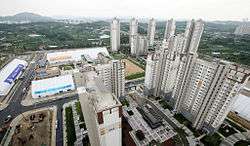
There are 49 competition venues and 48 training facilities that were used during the Games. Among the 49 competition venues, ten venues featured in six cities of Gyeonggi Province while another two featured in Chungju and Seoul. The rest of the venues featured in eight district and a county inside the metropolitan city of Incheon. Ten venues were constructed for the Games.[13] The Games also consist athletes and media villages that provide over 3,300 units and 9,560 rooms for athletes and media persons.[13]
The main stadium, known as Incheon Asiad Main Stadium, has an all-seater capacity of 61,074 seats, with 30,000 seats are variable after the Games.[14][15] The US$400 million stadium, originally planned for 70,000 seats, was designed by Populous, who has also designed several event venues around the world, including the Olympic Stadium of the 2012 Summer Olympics. The groundbreaking ceremony was held on June 28, 2011 in Yeonhui-dong. Construction began in June 2011 and finished in July 2014.[16][17]
Slogan
Unveiled on September 16, 2010, "Diversity Shines Here" is the official English slogan of the Games. It represents and highlights the significance of Asia’s wonderful diversity in history, cultures, and religions.[18] The official slogan in Korean, "평화의 숨결, 아시아의 미래" (RR: Pyeonghwaui sumgyeol, asiaui mirae), literally means "Breath of Peace, Future of Asia".
Marketing

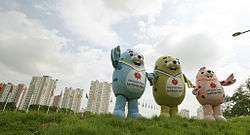
Three Spotted seal siblings were unveiled on November 4, 2010 as the official mascots of the Games in Songdo Island, Incheon. The three seals, known as "Barame (바라메)", "Chumuro (추므로)" and "Vichuon (비추온)", meaning wind, dance and light in Korean, were chosen in accordance with the theme of the main venue. The prototype was taken from Baengnyeong Island. According to the organizers, the mascots were chosen as symbolic to the future peace between South Korea and North Korea.[19][20]
The official emblem was also revealed on the same day, represented by a wing consisting of a string of the letter "A", for "Asia", with a shining sun at its upper left, symbolizing the Asian people holding hands in the sky.[19]
The six official posters for the Incheon Asian Games were released on March 31, 2011. The design represents the 28 Olympic sports categorized into five groups: racquet sports, ball sports, water sports, athletic sports and weight class. In various ways, the values and philosophy of the 17th Asian Games is represented in these posters.[21][22]
On September 27, 2012, Swiss watchmaker company Tissot was named as the official timekeeper of the Games.[23]
The official album was released by Universal Music was released on June 20, 2014, which featured "Only One", performed by JYJ as the official theme song of the Games.[24][25]
Transport
Incheon Subway's construction period was shortened rather than planned 2018 completion.[26] Due to the increasing popularity of Incheon International Airport during the Games, the immigration procedures were improved to better convenience the passengers.[27]
Medals
The medal design was approved by OCA on August 19, 2013. It features a pentagon-shaped symbol representing the five ports of Incheon — Airport, Seaport, Teleport, Leisureport and Businessport, with the emblem of Games inside. It symbolises the city as the hub of Northeast Asia.[28]
Costs
The cost of the Games was estimated at approximately US$1.62 billion, with the Korean government and Incheon government covering 19% and 78.9% respectively. Of the total budget, some US$1.39 billion was used for the construction of venue and infrastructure, while approximately US$11 million covered the building and maintenance of training grounds. Around US$103 million was allocated for road and transportation projects.[14]
However, a report in April 2012 suggested the city was under pressure on its financial due to uprising debt.[26]
The IAGOC saved US$34 million after agreeing to reduce from 15,000 to 2,025 athletes to be provided free of charge for transportation and accommodation.[29]
Torch relay
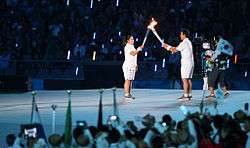
The torch was revealed in October 2013, with the design motif based on the official bird of Incheon Metropolitan City, the Crane, with the blue internal cylinder of torch signifying the sky and the ocean of Incheon. Another four colors (green, yellow, red, violet) were designed to represent the five regions of Asia.[30]
The torch was lit at Dhyan Chand National Stadium in New Delhi, India on August 9, 2014. This marked the first time the torch was lit outside the host country.[31] For the first time also, the Games hosted by South Korea's city to have international torch relay as Weihai, a city in Shandong province of the People's Republic of China, was only the another city hosted the torch relay on August 12, 2014.[32][33]
The domestic lighting ceremony was held at Manisan on Ganghwa Island on August 12, 2014.[34] The domestic relay begin from August 13, 2014 and travel through 70 cities for 5,700 km until the opening ceremony.[35]
Calendar
In the following calendar for the 2014 Asian Games, each blue box represents an event competition, such as a qualification round, on that day. The yellow boxes represent days during which medal-awarding finals for a sport were held, which numeric representing the number of finals that were contested on that day. On the left the calendar lists each sport with events held during the Games, and at the right how many gold medals were won in that sport. There is a key at the top of the calendar to aid the reader.[36]
| OC | Opening ceremony | ● | Event competitions | 1 | Gold medal events | CC | Closing ceremony |
| September/October 2014 | 14th Sun |
15th Mon |
16th Tue |
17th Wed |
18th Thu |
19th Fri |
20th Sat |
21st Sun |
22nd Mon |
23rd Tue |
24th Wed |
25th Thu |
26th Fri |
27th Sat |
28th Sun |
29th Mon |
30th Tue |
1st Wed |
2nd Thu |
3rd Fri |
4th Sat |
Events |
|---|---|---|---|---|---|---|---|---|---|---|---|---|---|---|---|---|---|---|---|---|---|---|
| 2 | 2 | 2 | 2 | 2 | 10 | |||||||||||||||||
| 6 | 6 | 7 | 7 | 6 | 6 | 38 | ||||||||||||||||
| 1 | ● | 1 | 1 | 3 | ||||||||||||||||||
| ● | ● | ● | 1 | ● | ● | ● | ● | ● | ● | ● | 1 | 2 | ||||||||||
| ● | ● | ● | ● | 4 | 4 | 8 | ||||||||||||||||
| 5 | 8 | 7 | 4 | 11 | 11 | 1 | 47 | |||||||||||||||
| ● | ● | 1 | 1 | ● | ● | ● | 1 | 2 | 2 | 7 | ||||||||||||
| ● | ● | ● | ● | ● | ● | 1 | 1 | |||||||||||||||
| ● | ● | ● | ● | 1 | 1 | |||||||||||||||||
| ● | ● | ● | ● | ● | ● | ● | ● | ● | ● | ● | 1 | 1 | 2 | |||||||||
| 1 | 1 | 1 | 1 | ● | 2 | ● | 4 | ● | 2 | 12 | ||||||||||||
| ● | ● | ● | ● | ● | ● | ● | ● | 3 | ● | 10 | 13 | |||||||||||
| ● | 4 | 4 | ||||||||||||||||||||
| ● | ● | 12 | 12 | |||||||||||||||||||
| ● | ● | ● | ● | ● | ● | 1 | ● | ● | ● | ● | ● | ● | 1 | 2 | ||||||||
| 2 | 2 | |||||||||||||||||||||
| 2 | 2 | |||||||||||||||||||||
| 2 | 1 | 1 | 4 | |||||||||||||||||||
| 2 | 2 | 1 | 1 | 1 | 3 | 10 | ||||||||||||||||
| 1 | ● | 1 | ● | ● | 2 | 1 | 1 | 6 | ||||||||||||||
| 2 | 2 | 2 | 2 | 2 | 2 | 12 | ||||||||||||||||
| ● | ● | ● | ● | ● | ● | ● | ● | ● | ● | ● | ● | ● | ● | ● | 1 | 1 | 2 | |||||
| ● | ● | ● | 4 | 4 | ||||||||||||||||||
| 1 | 1 | 2 | 5 | 5 | 14 | |||||||||||||||||
| 1 | 1 | 2 | ||||||||||||||||||||
| 2 | 2 | |||||||||||||||||||||
| ● | ● | ● | ● | ● | ● | ● | ● | ● | 1 | 1 | 2 | |||||||||||
| ● | ● | ● | ● | ● | ● | ● | ● | ● | ● | 1 | 1 | 2 | ||||||||||
| 4 | 5 | 5 | 2 | 16 | ||||||||||||||||||
| ● | ● | ● | ● | ● | 2 | 2 | ||||||||||||||||
| 5 | 5 | 3 | 13 | |||||||||||||||||||
| 2 | 2 | 4 | ||||||||||||||||||||
| ● | ● | ● | ● | 7 | 7 | 14 | ||||||||||||||||
| ● | ● | 2 | 2 | |||||||||||||||||||
| ● | ● | ● | ● | ● | ● | ● | 14 | 14 | ||||||||||||||
| ● | ● | 2 | ● | ● | ● | ● | ● | 2 | ● | ● | ● | ● | 2 | 6 | ||||||||
| 4 | 4 | 4 | 4 | 4 | 10 | 6 | 6 | ● | 2 | 44 | ||||||||||||
| ● | ● | ● | 2 | ● | ● | ● | 2 | 4 | ||||||||||||||
| ● | ● | ● | 2 | ● | ● | 3 | 2 | 7 | ||||||||||||||
| 4 | 4 | 4 | 4 | 16 | ||||||||||||||||||
| ● | ● | ● | ● | 2 | ● | ● | ● | ● | 3 | 2 | 7 | |||||||||||
| ● | 2 | 1 | 2 | ● | 2 | 7 | ||||||||||||||||
| 2 | 1 | 3 | ||||||||||||||||||||
| ● | ● | ● | ● | ● | ● | ● | ● | 1 | 1 | 2 | ||||||||||||
| ● | ● | ● | ● | ● | ● | ● | ● | ● | ● | ● | ● | 1 | 1 | 2 | ||||||||
| 2 | 2 | 2 | 2 | 2 | 2 | 3 | 15 | |||||||||||||||
| 4 | 4 | 4 | 4 | 4 | 20 | |||||||||||||||||
| 2 | 2 | 2 | 2 | 7 | 15 | |||||||||||||||||
| OC | CC | N/A | ||||||||||||||||||||
| Daily medal events | 18 | 24 | 27 | 29 | 38 | 38 | 22 | 24 | 30 | 32 | 29 | 46 | 41 | 34 | 7 | 439 | ||||||
| Cumulative Total | 18 | 42 | 69 | 98 | 136 | 174 | 196 | 220 | 250 | 282 | 311 | 357 | 398 | 432 | 439 | |||||||
| September/October 2014 | 14th Sun |
15th Mon |
16th Tue |
17th Wed |
18th Thu |
19th Fri |
20th Sat |
21st Sun |
22nd Mon |
23rd Tue |
24th Wed |
25th Thu |
26th Fri |
27th Sat |
28th Sun |
29th Mon |
30th Tue |
1st Wed |
2nd Thu |
3rd Fri |
4th Sat |
Total events |
Games
Opening ceremony
The opening ceremony started at 18:00 local time on September 19, 2014. The performance was directed by the film director Im Kwon-taek with playwright and actor Jang Jin, with entertainer Kim Seong-ju and KBS emcee Yun Su-yeong were the host of the ceremony.[37][38] It was attended by President of South Korea, Park Geun-hye, President of International Olympic Committee Thomas Bach, Tokyo Governor Yōichi Masuzoe and also Incheon Mayor Yoo Jeong-bok.[37]
Actors Jang Dong-gun and Kim Soo-hyun led the performance, which was covered in four acts, from "Asia long time ago", "Asia meeting through the sea", "Asia as family and friends", and "Asia as one and future joining with today", displayed the Korea past and future with digital technology. Other performers included Chinese pianist Lang Lang, soprano Sumi Jo,[39] JYJ, Exo, and Psy, who wrapped up the ceremony with a performance of Gangnam Style.[40]
Sports
The 2014 Asian Games featured 28 Olympic sports that would be contested at the 2016 Summer Olympics. In addition, eight non-Olympic sports were featured: baseball, ten-pin bowling, cricket, kabaddi, karate, sepak takraw, squash and wushu. The list was finalized on December 9, 2010 at the OCA's executive board meeting in Muscat, Oman.[41][42] This resulted in six other sports: roller sport, board games (chess, go, xiangqi), cue sports, softball, dancesport and dragon boat, which were held in previous Games being dropped from the list.[43] The list was approved on July 13, 2011 during the 30th annual general assembly in Tokyo as softball was incorporated with baseball as one sport while soft tennis came under the discipline of tennis.[44] For the first time, compound archery, mixed relay triathlon, judo team events were introduced.[45][46]
The changes in the non-Olympic sports featured at the Asian Games were influenced by discussions with organizers, who had suggested the removal of cricket from the program because they felt too few countries played it and because they lacked the infrastructure to host it. However, the OCA disputed the proposed removal of cricket, citing its popularity and viewer interest.[47]
|
|
|
|
|
Closing ceremony
The closing ceremony was held at 07:00 pm local time on October 4, 2014.[48] The theme of the ceremony is "Our Cherished Memories of Incheon". The sequence of events featured the performances of National Dance Company of Korea, Gugak Center Dance Troupe and Kukkiwon.[49]
The ceremony also included the segment from the next Asian Games host city, Jakarta and Palembang. It starts with "The Colours of Jakarta", featured a Javanese dance known as Ronggeng. It followed by "The Spirit of South Sumatra", featured Malay dance accompaniment of Rampak Nusantara drums. IOC member Rita Subowo,Governor of South Sumatra Alex Noerdin, and the Governor of Jakarta Basuki Tjahaja Purnama received the Games flag for the 2018 Games.[50]
The K-Pop stars wrapped up the closing ceremony, featured CNBLUE, Big Bang and Sistar.[49]
Medal table
China led the medal table for the ninth consecutive time. Cambodia won their first Asian Games gold medal in taekwondo.[51] A total of 37 NOCs won at least one medal, and 28 NOCs won at least one gold medal. 8 NOCs failed to win any medal at the Games.
The top ten ranked NOCs at these Games are listed below. The host nation, South Korea, is highlighted.
* Host nation (South Korea)
| Rank | Nation | Gold | Silver | Bronze | Total |
|---|---|---|---|---|---|
| 1 | 151 | 109 | 85 | 345 | |
| 2 | 79 | 70 | 79 | 228 | |
| 3 | 47 | 77 | 76 | 200 | |
| 4 | 28 | 23 | 33 | 84 | |
| 5 | 21 | 18 | 18 | 57 | |
| 6 | 12 | 7 | 28 | 47 | |
| 7 | 11 | 15 | 36 | 62 | |
| 8 | 11 | 11 | 14 | 36 | |
| 9 | 10 | 18 | 23 | 51 | |
| 10 | 10 | 0 | 4 | 14 | |
| 11–37 | Remaining | 59 | 97 | 179 | 335 |
| Totals (37 nations) | 439 | 445 | 575 | 1459 | |
Participating National Olympic Committees
All 45 members of the Olympic Council of Asia participated, this including North Korea, who initially threatened to boycott the Games after disputes with South Korea over administrative issues concerning its delegation of athletes and officials.[52] Saudi Arabia was the sole NOC not to send female athletes to the Games.[53]
Below is a list of all the participating NOCs; the number of competitors per delegation is indicated in brackets.
| Participating National Olympic Committees |
|---|
|
Concerns and controversies
Prior to the Games, there were several controversies over finances, lack of public interest,[99] transportation shortages for journalists,[100] and several administrative decisions regarding the opening ceremony and gala show.[101][102][103] Organizers were able to generate more interest but there were a few hundred empty seats in the 61,000-capacity stadium at the start of the opening ceremony.[104] Organizers also supplied more shuttle buses for the late-night shifts at the request of various international media organizations.[105]
In addition, the OCA and FIBA failed to compromise on a couple of policies, causing one team to boycott the event and forcing three teams to find replacement players. The Qatari women's basketball team withdrew from the Games when FIBA reaffirmed its ban on hijab, citing safety concerns.[106] Basketball became the only sport to enforce a hijab ban in the Games. On the other hand, OCA policy on naturalized players contradicted the eligibility rules set by FIBA. The OCA disqualified United States-born players Quincy Davis, Andray Blatche, and Aaron Haynes from the Chinese Taipei, Filipino, and South Korean teams.[107][108]
During the Games there were several controversies, mostly revolving around poor officiating. The vast majority of poor judging allegations occurred in boxing, highlighted by the controversial semifinal loss of Indian lightweight boxer Laishram Sarita Devi against eventual silver medalist Park Jina of South Korea.[109] The judging of the match, Sarita Devi's refusal to accept the bronze medal, and her questionable behavior at the medal ceremony received widespread international attention and sparked numerous debates.[110] The high volume of controversial boxing decisions led to accusations against the judges for widespread incompetence and host favoritism. Criticisms of the new scoring system have also been brought up.[111] Shooting,[112] and wrestling saw initial rulings by officials being overturned following appeals.[113]
Some 1,920 samples from 1,600 athletes were tested during the Games. Six athletes tested positive for banned substances and were sent home from the Games, including two gold medalists that were stripped of their medals.[114]
See also
References
- ↑ "2014 Asian Games to promote regional harmony". The Korea Herald. 2010-06-07. Retrieved 2010-07-04.
- ↑ "Asian Games: 14 world records broken, six doping cases registered". Sportskeeda. 4 October 2014. Retrieved 4 October 2014.
- ↑ "Japanese swimmer Kosuke Hagino awarded MVP of Incheon Asian Games". English.news.cn. 4 October 2014. Retrieved 4 October 2014.
- ↑ Linden, Julian (4 October 2014). "Successful Games launches Asia's golden age of sport". Reuters. Retrieved 4 October 2014.
- ↑ "India makes formal bid for 2014 Asiad". oneindia. 2006-02-12. Archived from the original on 2007-10-19. Retrieved 2010-07-04.
- 1 2 "Money could decide 2014 Asian Games bid". DNA India. 2007-04-17. Retrieved 2010-07-04.
- ↑ "S Korea's Incheon wins bid to host 2014 Asian Games". CCTV International. 2007-04-18. Retrieved 2010-07-04.
- ↑ "Incheon to Host 2014 Asian Games". The Korea Times. 2007-04-18. Retrieved 2010-07-04.
- ↑ "2014 아시안게임 유치...인천도 해냈다". Naver. 2007-04-18. Retrieved 2010-07-04.
- ↑ "India vs. China as a Global Sporting Events Host". Bloomberg BusinessWeek. 2008-09-19. Retrieved 2010-07-04.
- ↑ "Delhi loses bid to host 2014 Asian Games". Outlook India. 2007-04-17. Archived from the original on 2012-07-16. Retrieved 2010-07-04.
- ↑ "Pollution, traffic could have cost Delhi the Asian Games". Zee News. 2007-04-18. Retrieved 2010-04-07.
- 1 2 Sun-Hyoung, Kim (10 January 2010). "2014 Incheon Asian Games Brief". IAGOC. Archived from the original on 21 April 2014. Retrieved 20 April 2014.
- 1 2 Walden, Laura (2011-11-17). "Incheon 2014: Asian Games to have US$1.62 billion budget with new program". SportsFeatures.com. Retrieved 2011-11-27.
- ↑ "Incheon Asiad Main Stadium". IAGOC. Incheon2014ag.org. Archived from the original on 19 April 2014. Retrieved 20 April 2014.
- ↑ "Groundbreaking ceremony held for Incheon Asian Games main stadium". Korea.net. 2011-07-11. Retrieved 2011-07-14.
- ↑ "2014 premiere in Korea for Populous". World Architecture News. 2009-05-06. Archived from the original on 28 May 2010. Retrieved 2010-07-04.
- ↑ "2014 Incheon Asian Games announces official slogan". Korea.net. 2010-10-14. Retrieved 2010-10-24.
- 1 2 Xinhua (2010-11-05). "Mascots, emblem for 2014 Incheon Asian Games unveiled". China Daily. Retrieved 2010-11-05.
- ↑ "17 Asian Games Incheon".
- ↑ "Incheon Asian Games Posters Unveiled". Ocasia. Ocasia. Retrieved 5 October 2018.
- ↑ "Pictures of the day: 31 March 2011". Telegraph. 2011-03-31. Retrieved 2011-04-10.
- ↑ "Tissot, Official Timekeeper of the 17th Asian Games Incheon 2014". MarketWatch. 2012-09-27. Retrieved 2012-09-27.
- ↑ "JYJ to sing the official song of 2013 Incheon Asian Games". Yahoo! Malaysia Entertainment. 2013-09-03. Retrieved 2013-09-07.
- ↑ Ji-young, Sohn (2014-06-23). "Incheon Asian Games official album released". The Korea Herald. Retrieved 2014-06-26.
- 1 2 Jeong-ju, Na (2012-04-04). "In financial pinch, Incheon under pressure to downscale Asiad plan". The Korea Times. Retrieved 2012-04-22.
- ↑ 仁川机场一季度出入境人数突破1000万. News.163.com (in Chinese). 13 April 2014. Retrieved 13 April 2014.
- ↑ "Asian Games: Incheon Asian Games medal design revealed". SportAsia. 29 September 2013. Retrieved 13 April 2014.
- ↑ "Incheon Saves Cost of 2014 AG". IAGOC. 2013-06-30. Archived from the original on 2013-11-05. Retrieved 2013-09-07.
- ↑ Sun-Hyoung, Kim (14 October 2013). "2014 AG Torch Designs Are Revealed". IAGOC. Archived from the original on 17 April 2014. Retrieved 27 March 2014.
- ↑ Das, Suprita (9 August 2014). "Asian Games Returns to its Roots for Torch Relay". NDTV. Retrieved 12 August 2014.
- ↑ "仁川亚运会火炬在中国威海传递". Cqnews.net. 12 August 2014. Retrieved 12 August 2014.
- ↑ "Incheon organsiers plan New Delhi flame-lighting for 17th Asian Games". Chinese Olympic Committee. 1 November 2013. Retrieved 27 March 2014.
- ↑ "Asian Games torch lit in host city Incheon". The Korean Herald. 12 August 2014. Retrieved 12 August 2014.
- ↑ You, Anna (11 August 2014). "The Torch of the Incheon Asian Games lights in New Delhi". IAGOC. Incheon2014ag.org. Archived from the original on 12 August 2014. Retrieved 12 August 2014.
- ↑ "General Competition Schedule for the 17th Asian Games" (PDF). Olympic Council of Asia. Ocasia.org. Archived from the original (PDF) on 2015-09-24. Retrieved 26 March 2014.
- 1 2 Hueston, Dave. "Festive opening ceremony marks start of Asian Games". The Japan Times. Kyodo. Retrieved 20 September 2014.
- ↑ "Asian Games Opening Ceremony: a showcase to Korea's past and future". IBN. Retrieved 20 September 2014.
- ↑ Oinam, Jayantam (19 September 2014). "2014 Incheon Asian Games: Opening Ceremony - As it happened..." ZeeNews. Retrieved 20 September 2014.
- ↑ Bodeen, Christopher (19 September 2014). "Asian Games opening ceremony closes Gangnam Style". Newstimes.com. Archived from the original on 20 September 2014. Retrieved 20 September 2014.
- ↑ "Incheon 2014 issues delayed". Olympic Council of Asia. 2010-11-13. Archived from the original on 2011-07-27. Retrieved 2010-11-14.
- ↑ "Incheon Asian Games to Feature 36 Sports". The Chosun Ilbo. 2010-12-10. Retrieved 2010-12-10.
- ↑ "Thirty-six sports to be competed at 2014 Incheon Asian Games". BusinessGhana. 2010-12-09. Retrieved 2010-12-10.
- ↑ "Official sports program approved at 58th OCA Executive Board meeting". Incheon2014ag.org. 2011-07-14. Retrieved 2011-07-14.
- ↑ Sabanayakan, S. (2011-12-03). "Incheon Asian Games to include compound archery". The Hindu. Retrieved 2011-12-03.
- ↑ 仁川亚运会首枚金牌将诞生于射击女子10米气步枪. China News (in Chinese). 12 April 2014. Retrieved 13 April 2014.
- ↑ K Samyal, Sanjjeev (2010-11-17). "India may face a gold drought at Incheon Asian Games 2014". Daily News & Analysis. Retrieved 2010-11-25.
- ↑ 仁川亚组委揭秘第17届亚运会. gxnews.com.cn (in Chinese). 11 April 2014. Retrieved 13 April 2014.
- 1 2 Oinam, Jayanta (4 October 2014). "Incheon Asian Games: Closing Ceremony - As it happened..." Zee News. Retrieved 6 October 2014.
- ↑ Butler, Nick (4 October 2014). "Asian Games: The Closing Ceremony". inside the games. Retrieved 6 October 2014.
- ↑ Sony, Ouch (4 October 2014). "In Taekwondo, Cambodia Wins First Asian Games Gold". The Cambodia Daily. Retrieved 4 October 2014.
- ↑ Ransom, Ian (27 August 2014). "North Korea in Asian Games talks with South". stuff.co.nz. Reuters. Retrieved 20 September 2014.
- ↑ "2014 Asian Games: Psy's 'Gangnam Style' kicks off spectacular opening ceremony". ZeeNews. Reuters. 20 September 2014. Retrieved 20 September 2014.
- ↑ "Afghanistan". Incheon2014ag.org. Archived from the original on 17 September 2014. Retrieved 16 September 2014.
- ↑ "Bahrain". Incheon2014ag.org. Archived from the original on 17 September 2014. Retrieved 16 September 2014.
- ↑ "Bangladesh". Incheon2014ag.org. Archived from the original on 17 September 2014. Retrieved 16 September 2014.
- ↑ "Bhutan". Incheon2014ag.org. Archived from the original on 17 September 2014. Retrieved 16 September 2014.
- ↑ "Brunei Darussalam". Incheon2014ag.org. Archived from the original on 17 September 2014. Retrieved 16 September 2014.
- ↑ "Cambodia". Incheon2014ag.org. Archived from the original on 17 September 2014. Retrieved 16 September 2014.
- ↑ "China". Incheon2014ag.org. Archived from the original on 17 September 2014. Retrieved 16 September 2014.
- ↑ "Chinese Taipei". Incheon2014ag.org. Archived from the original on 17 September 2014. Retrieved 16 September 2014.
- ↑ "Timor-Leste". Incheon2014ag.org. Archived from the original on 17 September 2014. Retrieved 16 September 2014.
- ↑ "Hong Kong, China". Incheon2014ag.org. Archived from the original on 17 September 2014. Retrieved 16 September 2014.
- ↑ "India". Incheon2014ag.org. Archived from the original on 17 September 2014. Retrieved 16 September 2014.
- ↑ "Indonesia". Incheon2014ag.org. Archived from the original on 17 September 2014. Retrieved 16 September 2014.
- ↑ "Iran". Incheon2014ag.org. Archived from the original on 17 September 2014. Retrieved 16 September 2014.
- ↑ "Iraq". Incheon2014ag.org. Archived from the original on 17 September 2014. Retrieved 16 September 2014.
- ↑ "Japan". Incheon2014ag.org. Archived from the original on 17 September 2014. Retrieved 16 September 2014.
- ↑ "Jordan". Incheon2014ag.org. Archived from the original on 17 September 2014. Retrieved 16 September 2014.
- ↑ "Kazakhstan". Incheon2014ag.org. Archived from the original on 17 September 2014. Retrieved 16 September 2014.
- ↑ "DPR Korea". Incheon2014ag.org. Archived from the original on 17 September 2014. Retrieved 16 September 2014.
- ↑ "Korea". Incheon2014ag.org. Archived from the original on 17 September 2014. Retrieved 16 September 2014.
- ↑ "Kuwait". Incheon2014ag.org. Archived from the original on 17 September 2014. Retrieved 16 September 2014.
- ↑ "Kyrgyzstan". Incheon2014ag.org. Archived from the original on 17 September 2014. Retrieved 16 September 2014.
- ↑ "Laos". Incheon2014ag.org. Archived from the original on 17 September 2014. Retrieved 16 September 2014.
- ↑ "Lebanon". Incheon2014ag.org. Archived from the original on 17 September 2014. Retrieved 16 September 2014.
- ↑ "Macau, China". Incheon2014ag.org. Archived from the original on 17 September 2014. Retrieved 16 September 2014.
- ↑ "Malaysia". Incheon2014ag.org. Archived from the original on 17 September 2014. Retrieved 16 September 2014.
- ↑ "Maldives". Incheon2014ag.org. Archived from the original on 17 September 2014. Retrieved 16 September 2014.
- ↑ "Mongolia". Incheon2014ag.org. Archived from the original on 17 September 2014. Retrieved 16 September 2014.
- ↑ "Myanmar". Incheon2014ag.org. Archived from the original on 17 September 2014. Retrieved 16 September 2014.
- ↑ "Nepal". Incheon2014ag.org. Archived from the original on 17 September 2014. Retrieved 16 September 2014.
- ↑ "Oman". Incheon2014ag.org. Archived from the original on 17 September 2014. Retrieved 16 September 2014.
- ↑ "Pakistan". Incheon2014ag.org. Archived from the original on 17 September 2014. Retrieved 16 September 2014.
- ↑ "Palestine". Incheon2014ag.org. Archived from the original on 17 September 2014. Retrieved 16 September 2014.
- ↑ "Philippines". Incheon2014ag.org. Archived from the original on 17 September 2014. Retrieved 16 September 2014.
- ↑ "Qatar". Incheon2014ag.org. Archived from the original on 17 September 2014. Retrieved 16 September 2014.
- ↑ "Saudi Arabia". Incheon2014ag.org. Archived from the original on 17 September 2014. Retrieved 16 September 2014.
- ↑ "Singapore". Incheon2014ag.org. Archived from the original on 17 September 2014. Retrieved 16 September 2014.
- ↑ "Sri Lanka". Incheon2014ag.org. Archived from the original on 17 September 2014. Retrieved 16 September 2014.
- ↑ "Syria". Incheon2014ag.org. Archived from the original on 17 September 2014. Retrieved 16 September 2014.
- ↑ "Tajikistan". Incheon2014ag.org. Archived from the original on 17 September 2014. Retrieved 16 September 2014.
- ↑ "Thailand". Incheon2014ag.org. Archived from the original on 17 September 2014. Retrieved 16 September 2014.
- ↑ "Turkmenistan". Incheon2014ag.org. Archived from the original on 17 September 2014. Retrieved 16 September 2014.
- ↑ "United Arab Emirates". Incheon2014ag.org. Archived from the original on 17 September 2014. Retrieved 16 September 2014.
- ↑ "Uzbekistan". Incheon2014ag.org. Archived from the original on 17 September 2014. Retrieved 16 September 2014.
- ↑ "Vietnam". Incheon2014ag.org. Archived from the original on 17 September 2014. Retrieved 16 September 2014.
- ↑ "Yemen". Incheon2014ag.org. Archived from the original on 17 September 2014. Retrieved 16 September 2014.
- ↑ "Debts and empty seats taint start of 2014 Asian Games at Incheon". The National Sport. 19 September 2014. Retrieved 27 September 2014.
- ↑ "亚运交通让人心塞 场馆分布分散需搭区间车前往". hinews.cn. 19 September 2014. Retrieved 27 September 2014.
- ↑ "JYJ excluded from Incheon Asian Games opener". ManilaBulletin. 2 July 2014. Archived from the original on 14 July 2014. Retrieved 4 July 2014.
- ↑ "JYJ 측 공식입장 "인천AG 약속 지켜달라, 불공정 외압 아니길" [전문]". NATE. 1 July 2014. Retrieved 2 July 2014.
- ↑ Jee-ho, Yoo (19 September 2014). "(Asiad) Celebrity with no sports connection lights Asiad cauldron". Yonhap News Agency. Retrieved 4 October 2014.
- ↑ "Asian Games gets off to 'Gangnam Style' start". The Malay Mail Online. 19 September 2014. Retrieved 3 October 2014.
- ↑ Isacc, Alex (1 October 2014). "[Asian Games] IBC, the home to CCTV and NHK for 2014 Incheon Asian Games". Korea Herald. Retrieved 4 October 2014.
- ↑ "Asian Games: Qatar women's team pull out over hijab ban". BBC Sport. 25 September 2014. Retrieved 25 September 2014.
- ↑ Badua, Shelley (5 September 2014). "US-born player no longer eligible for Asian Games". Taipei Times. Retrieved 7 September 2014.
- ↑ Flojo, Enzo (19 September 2014). "Previewing the Asian Games basketball qualifiers". Rappler. Retrieved 20 September 2014.
- ↑ PTI (30 September 2014). "Mary Kom in final, Sarita Devi robbed of win at Asian Games". The Economic Times. Retrieved 1 October 2014.
- ↑ "Asian Games: Some in Indian team not happy with Sarita Devi's emotional outburst". The Times of India. PTI. 1 October 2014. Retrieved 1 October 2014.
- ↑ "Asian Games: Boxer Vikas Krishnan slams new scoring system". Zee News. 29 September 2014. Retrieved 4 October 2014.
- ↑ "Judoka Jeong defends Asiad title". The Korea Times. 22 September 2014. Retrieved 23 September 2014.
- ↑ "Asian Games: Controversy taints home team victories". The Korea Times. 1 October 2014. Retrieved 3 October 2014.
- ↑ Rutherford, Peter; Chakraborty, Amlan (3 October 2014). "Games-China's hammer champion Zhang tests positive". Mail Online. Reuters. Retrieved 3 October 2014.
External links
| Wikimedia Commons has media related to 2014 Asian Games. |
- Official website (archived)
| Preceded by Guangzhou |
Asian Games Incheon XVII Asiad (2014) |
Succeeded by Jakarta-Palembang |
